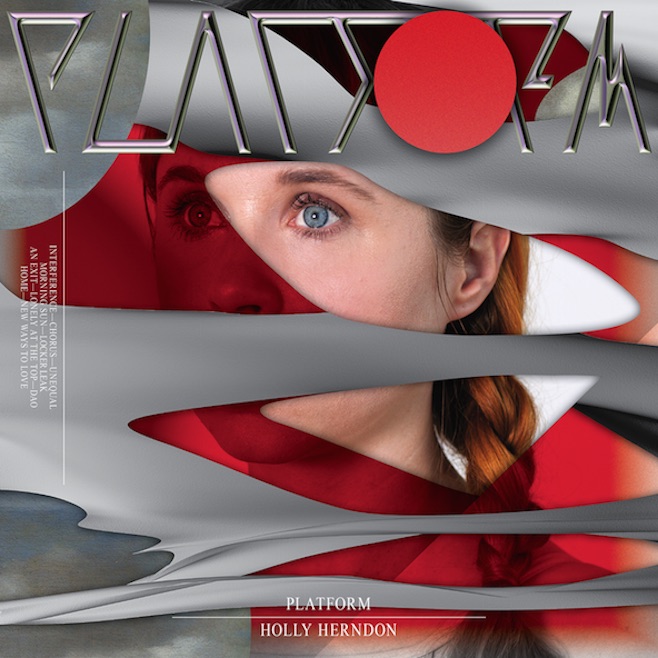
Ever the defender of the laptop as a gateway to more accurate and speculative expressions of the self, Herndon goes for the throat of the issues of our contemporary future with her second album, Platform.
Having gathered together several collaborators with varied abilities and perspectives, she holds a sort of speculative symposium in the form of ten audio tracks. Her focus is the "exit" to a new "platform," a collaborative space in which possible futures may take shape. There is a brighter future ahead in Herndon's world; technology has the effect not of separation, but of creating a deeply intrinsic closeness and intimacy strewn through collapsed spaces. The laptop: the medium is the message, is the massage.
Drawing on the work of philosopher of design Benedict Singleton, Herndon is proposing a mechanization of "platform dynamics theory.” Traditional planning for the future will always fail in the face of complexity and contingency, the theory goes, so instead we should focus on the design of platforms—the material and social infrastructures we inhabit, which have certain affordances and limitations and therefore open the way to different kinds of futures.
Herndon’s album, as a collaborative space for development, is offered as one such platform. The future is cooperation; Herndon has moved on from thinking about the laptop as an extension of the body to thinking about it as a platform through which a superstructural, collective experience can be had. Along with “platforms,” the album’s other essential keyword is "exits," signaled by the title to Track 06, “An Exit.” Exits leading from our present situation to new platforms, that is, rather than escapes to impossible utopias.
I do not share Herndon's optimism, but that doesn't detract from the resounding beauty of the record and her intentions. Many of her songs slip into dashing permutations not only for the listeners’ energies and attentions, but for the sake of shirking formal atomization. In this vein of personal experience amongst surveyed scapes, "Locker Leak" (featuring Spencer Longo) spits out "word sculptures" like luscious (a)targeted advertisements; tingling, visceral phrases like "Who lasts, lasts? Glass lasts, lasts" or "Be the first of your friends to buy Greek yogurt this summer."
Possibly the most indicative and radical tracks on Platform are placed beside each other, forming a quite beautiful top/bottom approach to - and critique of - net-body dualism. The first, "Lonely at the Top," featuring programmer and ASMR performer Claire Tolan, explores intimacy on the internet through the elicited sensations and mimicry of the tactile and auditory (acrylic nails on a keyboard, vocal intonations, etc.), whereas the following song, “DAO” (which stands for Data Access Object) contains the mapping of a body - a community as object through improvised, urbane movement.
“Lonely at the Top” contains a single voice along with eerily recognizable and affective sounds - Tolan preaching the intent of the record in a Brechtian turn in which the audience is the subject: "You naturally know how to attract possibility, and you always follow possibility into success." The track reminds me quite a bit of K-Hole’s Creative Leadership trend report for 032c magazine, in which they examine the corporation as defined by a perennial genius godhead. The image in the song is of a corporate one percenter being given a massage, the masseuse acting as a chorus of fans, these being people who rely on the talents of the creative leader to better the world with their exceptional abilities.
In the anterior of the dualistic investigation, “DAO” follows the feet and vocal flexibility of two performers taken from Herndon's Body/Sound Guggenheim performance. Contact mics are applied to a dancer who is then tracked; Herndon surveys his movements, archives them, and then tosses them back out. She wrestles with the body, hoping to tame it, and every so often the operatic vocal of the other 'body' makes its way sporadically into the mix as pure data metabolism. The track ultimately comes off as violent - feral in its attempt and eventual failure to escape the algorithmic categorization of the dancer's gestures. Herndon - in the middle, like a clinical chanteuse, a weaver of context and form - wrangles the desperate flinging subjects: the dromoscope is put into effect, the bodies blur into one, and identity is now an un-object of desire.
Exploration of the controlled expansion, and thus expression, of atomized form shows up in an earlier collaborative song called “Unequal.” “Unequal” is speculative, riding the boundary between deterritorializied gender-bent ballroom aesthetics and astral hymnal passages. Clods of digital debris are flung around the stereofield as composer and drag performer Colin Self and Herndon perform a modular duet. The inspirational material for this, I suspect, could be traced back to her online installation for DIS Magazine. In Dummy magazine, Herndon speaks of Colin Self playing a Joan of Arc figure, a sort of Ghost in the Shell take on Terre Thaemlitz (aka DJ Sprinkles).
I have many reservations about Herndon's hopeful approach, which could be ungenerously characterized as "teamwork as panacea for the total wreckage of humanity inflicted upon itself and its environment." This kind of platform is simply not available to everyone; Herndon and her cohort have enough capital to perform these collaborative acts and to create the space for an imagined future. All the same, I suppose that that is neither here nor there given that the effort is incredible and legitimate, and not completely founded on starry-eyed visions. Herndon and her record are practical and functional. Platform is automatic, investigative and hypertextual: boundless.
Platform is out today via 4AD and RVNG INTL.

